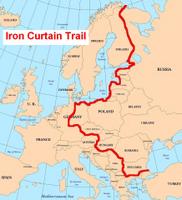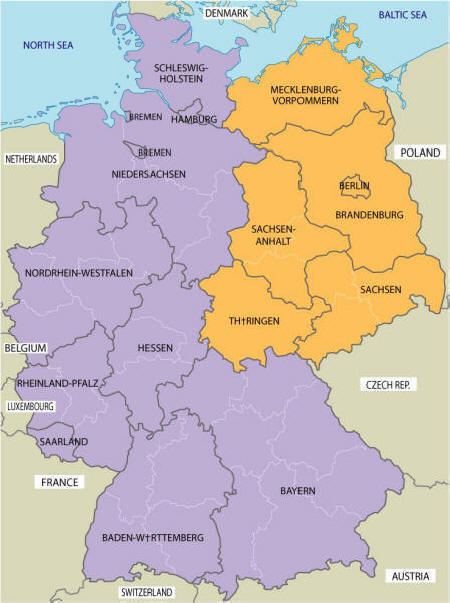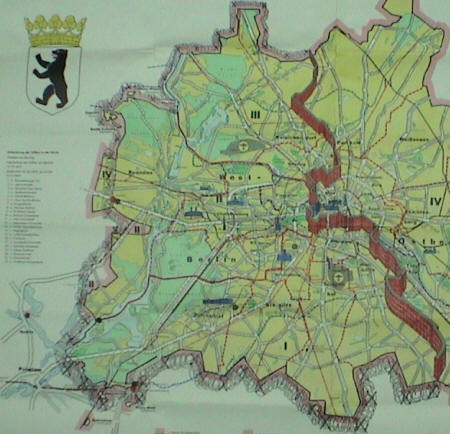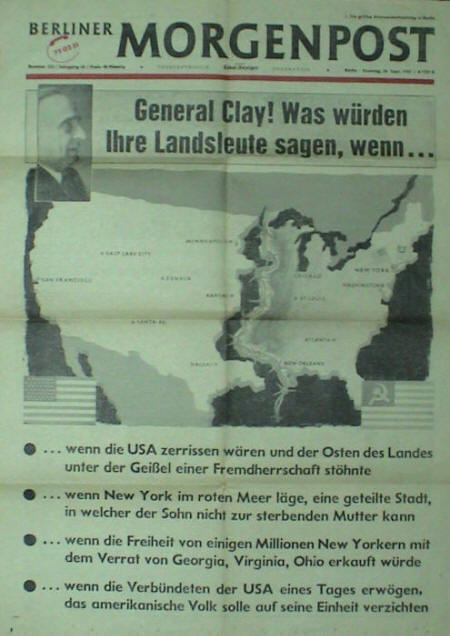|
The Iron Curtain Divided Europe and Berlin

During the time I was in Germany, Europe was divided by the
"Iron Curtain." Intense Communism controlled the lives of people in the
countries to the east of the iron curtain, contrasted with freedom in
countries to the west. The above map shows a proposed
tourist trail along where the Iron Curtain once stood.

Germany was split by the "Iron Curtain," with Communist East Germany (Deutsche
Demokratische Republik) [in orange color] on one side and free West Germany
(Bundesrepublik Deutschland) [in purple color] on the other side. Berlin was
stuck in the middle of Communist East Germany. It was an island of freedom in a
sea of communism, but the city of Berlin itself was also split in half.

At the end of World War II, Berlin (Germany's capital city) was divided into
four zones. West Berlin consisted of the American, British, and French zones.
East Berlin was the Soviet Union's zone. West Berlin became a popular way for
people behind the iron curtain to escape communism. They would enter communist
East Berlin and then cross into West Berlin and apply for refugee status. Then
they flew out of West Berlin to freedom in Western countries. During the summer
of 1961the flow of thousands of refugees per day became so intense that the
communists were forced to take drastic action. On August 13, 1961 they closed
the borders around West Berlin and began to build a wall through the middle of
the city of Berlin. They also surrounded the rest of West Berlin with a
concentration-camp-like fence with armed guard towers.
On September 24, 1961 the Berliner Morgenpost tried to describe their
plight to Americans. It published a front-page drawing of the United States with
a similar "iron curtain" splitting America down the Mississippi River and
dividing New York City into two halves, the eastern half being communist and the
western half being free.

The headline was directed at retired American General
Lucius D. Clay, who
was especially beloved by the people of Berlin. As the Military Governor of
Germany after World War II, he thwarted a Soviet blockade of Berlin by the
Berlin Airlift of 1948 - 1949. In 1961, he became President John F. Kennedy's
special representative in Berlin.
The newspaper reads: "General Clay! What would your countrymen say if...
- ...if the U.S.A. were torn and the eastern part of the country groaned
under the whip of a foreign rule?
- ...if New York lay in a red [e.g. communist] sea, a divided city in
which a son could not go to his dying mother?
- ...if the freedom of several million New Yorkers was bought with the
betrayal of Georgia, Virginia and Ohio?
- ...if the allies of the U.S.A. decided that the American people should
forego their unity?"
[Top]
[Back]
[Home]
|